News
2024
Presentación de demo en el congreso SEPLN CEDI 2024
Investigadores del grupo estarán en La Coruña el 20 de junio para presentar la demo "A Tool Suite for Cognitive Accessibility Leveraging Easy-to-Read Resources and Simplification Strategies", trabajo llevado a cabo en el proyecto ACCESS2 MEETPresentación del trabajo "Automatic Punctuation Model for Spanish Live Transcriptions" en LREC-COLING 2024
El congreso LREC-COLING 2024 se celebrará del 20 al 25 de mayo 2024 en Turín (Italia). El grupo HULAT presentará el trabajo "Automatic Punctuation Model for Spanish Live Transcriptions" realizado en el marco del proyecto PICOGAC y ACCESS2MEETEl CESyA ha sido galardonado con el premio Discapnet de la ONCE a las Tecnologías Accesibles
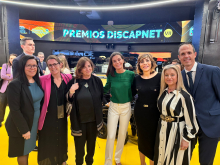 El Centro Español del Subtitulado y la Audiodescripción (CESyA) ha sido galardonado con el premio Discapnet de la ONCE a las Tecnologías Accesibles, unos galardones que reconocen la accesibilidad TIC y el compromiso con las personas con discapacidad. El premio fue entregado al CESyA por su carácter innovador y calidad global de los resultados obtenidos.
Ayer, jueves, la reina Letizia, que presidía esta entrega de Premios, entregó el premio a nuestro compañero Israel Carrasco. Felicidades a Israel y a todo su equipo.
El Centro Español del Subtitulado y la Audiodescripción (CESyA) ha sido galardonado con el premio Discapnet de la ONCE a las Tecnologías Accesibles, unos galardones que reconocen la accesibilidad TIC y el compromiso con las personas con discapacidad. El premio fue entregado al CESyA por su carácter innovador y calidad global de los resultados obtenidos.
Ayer, jueves, la reina Letizia, que presidía esta entrega de Premios, entregó el premio a nuestro compañero Israel Carrasco. Felicidades a Israel y a todo su equipo.
Defensa de la tesis doctoral Subtitulado Simplificado para Personas con Discapacidad
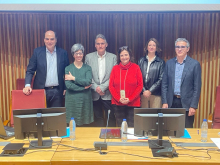 El día 20 de marzo 2024 Jose Manuel Masiello ha defendido en EPS de la Universidad Carlos III de Madrid la tesis doctoral Subtitulado Simplificado para Personas con Discapacidad dirigida por las profesoras Paloma Martínez y Belén Ruiz.
El día 20 de marzo 2024 Jose Manuel Masiello ha defendido en EPS de la Universidad Carlos III de Madrid la tesis doctoral Subtitulado Simplificado para Personas con Discapacidad dirigida por las profesoras Paloma Martínez y Belén Ruiz.
Lourdes Moreno, appointed as an expert member of the IFIP TC13 (Technical Committee on Human-Computer Interaction).
Lourdes Moreno was appointed as an expert member of the International Federation for Information Processing Technical Committee on Human-Computer Interaction (IFIP TC13) in September 2023. IFIP stands as the most significant organization in the field of Information and Communication Technologies (ICT). Recognized by the United Nations and other global entities, it represents IT societies from 56 countries or regions, spanning all five continents with a membership exceeding half a million. This body brings together more than 3500 scientists from academia and industry, organized into over 101 working groups reporting to 13 technical committees. Its vast influence and international recognition establish it as the most authoritative and esteemed entity in the ICT world.
The IFIP-TC13 is the technical committee dedicated to advancing human-computer interaction (HCI) technology. Its primary aim is to encourage empirical research and to promote the application of knowledge and methods from the human sciences in the design and evaluation of computer systems. The committee strives to enhance the understanding of the relationship between formal design methods and the usability and acceptability of systems. Additionally, it is committed to developing guidelines, models, and methods that assist designers in creating more user-oriented and humanized computer systems.
Lourdes Moreno has been honored as an expert member, an accolade that, in conjunction with her role as president of the Human-Person Interaction Association (AIPO), positions her strategically. Her objective is to cultivate synergies between both organizations, conveying to the Spanish community the new approaches and methods being developed internationally. Simultaneously, she serves as a conduit to inform IFIP of the achievements and lines of work being pursued in Spain.
The main working groups of IFIP-TC13 are:
- Education in HCI and HCI Curriculum
- Methodologies for User-Centered Systems Design
- Human-Computer Interaction, Disability and Aging
- User Interface Engineering
- Human Error, Resilience, Reliability, Safety and System Development
- Human-Work Interaction Design group (HWID)
- Human-Computer Interaction & Visualization (HCIV)
- Interaction Design and International Development
- Interaction Design and Children
- Human-Centred Technology for Sustainability
Tesis Doctoral Weakly supervised Deep Learning for Natural Language Processing
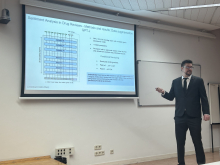 El pasado 21 de Diciembre, Cristóbal Colón-Ruiz defendió la tesis doctoral “Weakly supervised Deep Learning for Natural Language Processing”, dirigida por Isabel Segura-Bedmar, Profesora Titular del Departamento de Informática de la Universidad Carlos III de Madrid, miembro del grupo Hulat y vocal de la Sociedad IABIOMED.
Los recientes avances en procesamiento del lenguaje natural (PLN) se atribuyen a modelos de aprendizaje profundo, especialmente los transformers. Sin embargo, estos modelos requieren grandes cantidades de datos anotados, que son costosos de generar. La tesis aborda este desafío desarrollando métodos para PLN con pocos datos, empleando técnicas semi-supervisadas y modelos generativos. Estos métodos han mostrado resultados prometedores, especialmente en aplicaciones biomédicas, y podrían ser útiles en otros contextos de PLN pese a la limitación de datos.
El pasado 21 de Diciembre, Cristóbal Colón-Ruiz defendió la tesis doctoral “Weakly supervised Deep Learning for Natural Language Processing”, dirigida por Isabel Segura-Bedmar, Profesora Titular del Departamento de Informática de la Universidad Carlos III de Madrid, miembro del grupo Hulat y vocal de la Sociedad IABIOMED.
Los recientes avances en procesamiento del lenguaje natural (PLN) se atribuyen a modelos de aprendizaje profundo, especialmente los transformers. Sin embargo, estos modelos requieren grandes cantidades de datos anotados, que son costosos de generar. La tesis aborda este desafío desarrollando métodos para PLN con pocos datos, empleando técnicas semi-supervisadas y modelos generativos. Estos métodos han mostrado resultados prometedores, especialmente en aplicaciones biomédicas, y podrían ser útiles en otros contextos de PLN pese a la limitación de datos.
2023
Curso sobre Procesamiento de Lenguaje Natural con Aprendizaje Profundo
La profesora Isabel Segura Bedmar ha desarrollado un curso OCW para su asignatura de Procesamiento de Lenguaje Natural con Aprendizaje Profundo en el Máster de Ciencia y Tecnología Informática.
El curso proporciona una amplia colección de ejercicios y vídeos cortos que permitirá a los estudiantes que lo realicen conseguir un amplio conocimiento de las principales tareas y aplicaciones de PLN, así como de los principales modelos de aprendizaje profundo utilizados como soluciones de estas aplicaciones. Estos modelos abarcan desde las redes convolucionales y recurrentes, hasta los modelos transformers. Además, el curso también incluye un tema dedicado al tema de data augmentation para la generación de nuevas instancias sintéticas a partir de textos anotados para distintas tareas.
Es un curso con un enfoque muy práctico, que esperamos que resulte ameno y de utilidad para la comunidad de PLN.
Presentation of the Access2Citizen Project. Accessibility to the 112 emergency services.
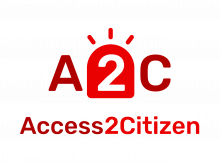 The "Royal Board on Disability of the Ministry of Social Rights", together with its consulting entity the "Spanish Center for Subtitling and Audio Description (CESyA)", managed by the "Universidad Carlos III de Madrid", has carried out the 'Access2Citizen' project with the objective of ensuring that telematic and telephone emergency services are accessible to people with sensory and cognitive disabilities.
The "Royal Board on Disability of the Ministry of Social Rights", together with its consulting entity the "Spanish Center for Subtitling and Audio Description (CESyA)", managed by the "Universidad Carlos III de Madrid", has carried out the 'Access2Citizen' project with the objective of ensuring that telematic and telephone emergency services are accessible to people with sensory and cognitive disabilities.
Publication of the article: "Designing user interfaces for content simplification aimed at people with cognitive impairments"
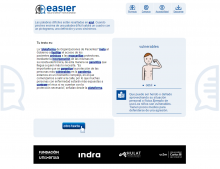 The article "Designing user interfaces for content simplification aimed at people with cognitive impairments" de Lourdes Moreno, Helen Petrie, Paloma Martínez y Rodrigo Alarcon has been published in the Journal Universal Access in the Information Society (UAIS). It results from a collaboration between the HULAT group and the researcher Helen Petrie from the University of York.
The article "Designing user interfaces for content simplification aimed at people with cognitive impairments" de Lourdes Moreno, Helen Petrie, Paloma Martínez y Rodrigo Alarcon has been published in the Journal Universal Access in the Information Society (UAIS). It results from a collaboration between the HULAT group and the researcher Helen Petrie from the University of York.
